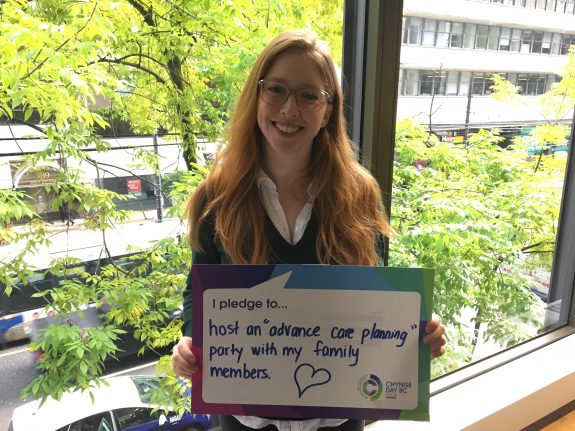Contributed by Chelsea Hochfilzer, BCPSQC.
This pledge has been many years in the making. I first heard about advance care planning several years ago through working at the Council. It immediately sparked my interest. I printed out six copies of My Voice, told my parents, my sister and each of our respective significant others that I wanted to have them over for dinner and spend the evening filling out the forms all together. I’m sure they weren’t completely certain what I was talking about, but they have a wonderful tendency to humour me so everyone was on board.
Weeks turned into months, which turned into years and I still didn’t follow through. We thought about it many times (“Oh yeah, we still have to do that!”) but while we all live in the same city and see each other often, it just didn’t happen. It’s easy to commit to getting together to celebrate birthdays, hear about trips, or even for no reason at all. But having these advance care discussions isn’t something any of us felt could be done on the fly, and while over time we all saw the value it just never rose to the top as a priority.
And then last year, unexpectedly and with very little warning, we suddenly found ourselves in the situation of having to plan for my then 61 year old father’s end of life. His communication skills were severely restricted in his final weeks, which left my sister, mother and I to speak for him. Thankfully we all had an extremely close relationship and knew each other well. Between the three of us, we were well supported and always on the same page. But there were still questions and moments of uncertainty.
One thing I wouldn’t have thought about was how much he was going to rely on our opinions as he considered his health and care options. Though it wasn’t until quite close to the end that my Dad was no longer able to make decisions for himself, throughout he often asked us what we thought he should do.
My mom, sister and I did the best we could with our shared knowledge and empathy, but no matter how well you know someone, it’s incredibly difficult to make such weighty decisions on their behalf – how much is a person willing to go through? How do they want to be remembered? What are their fears? How can you truly put their soul at ease? No matter how confident we were with a decision, it would have been amazing to see it in his writing and/or read it in his words.
Through this experience I realized that planning for the end of your life when you’re clear of mind is one of the kindest things you can do for the people you love. To lift some of the weight of uncertainty in a time of terrible grief is a gift. And it’s never too soon to give it. At 28, I’ll be doing my advance care planning alongside my family this week.


